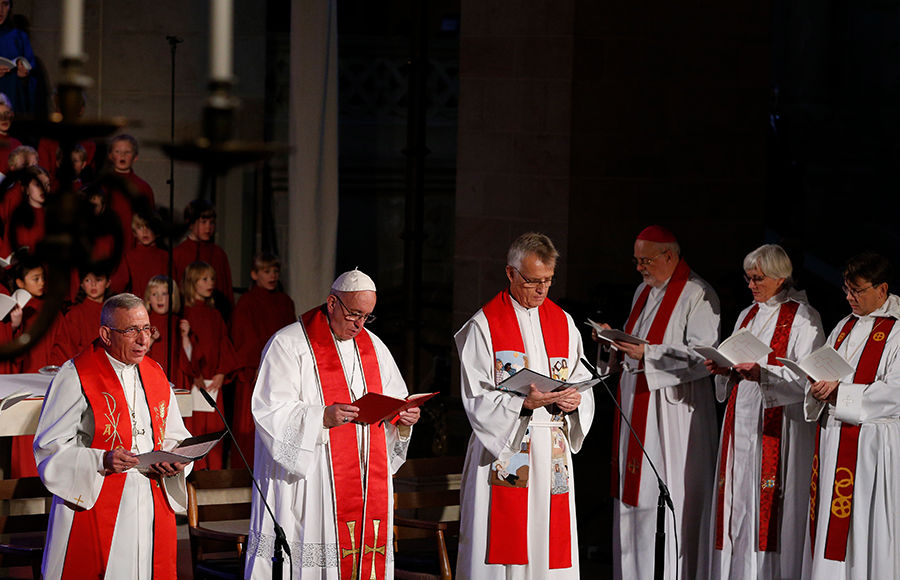On Oct. 31, 1517, the German Augustinian monk Martin Luther nailed his “95 Theses” to the door of the Wittenberg Castle Church. Luther’s theses challenged certain teachings, practices and abuses of the Church in his day. From that moment in history, decades of religious, political, intellectual and cultural upheaval began that resulted in European Christianity being splintered into various churches, sects and factions.
This period of change, the Reformation, set in place structures and beliefs that would define and divide the world of the modern era. The Reformation movement gave birth to various independent “protestant” churches. It also led to much-needed self-examination, change and renewal in the Catholic Church.
Recognizing the damages these religious divisions have caused in the world, the restoration of unity among all Christians was one of the principal concerns of the Second Vatican Council. The Vatican II’s Decree on Ecumenism (November 1964) led to a new and official dialogue between Catholics and Lutherans. Ongoing discussions over the ensuing 50 years have produced other important work aimed at seeking theological common ground, recognizing that “what unites us is far greater than what divides us.”
To commemorate the 500th anniversary of Luther’s “95 Theses,” the Lutheran-Catholic dialogue has now composed a joint statement entitled “From Conflict to Communion: Commemoration of the 500th Anniversary of the Reformation.” It can be found online at the Vatican website or the Lutheran world website. The United States Catholic Bishops website (usccb.org) also provides a bibliography of other resources for reflection on this topic.
Included in this joint statement is a format for prayer in common. The Office for Worship would like to encourage that our Catholic parishes invite their Lutheran church neighbors to join them in this prayer, celebrating a shared joy in the Gospel, as well as sorrow for the division that our churches have known for so many years. This recommended ecumenical prayer service can be found on our website at laliturgy.org.
In the document “From Conflict to Communion” it states: “The Church is the body of Christ. As there is only one Christ, so also, he has only one body. Through baptism, human beings are made members of this body. Since Catholics and Lutherans are bound to one another in the body of Christ as members of it, then it is true of them what Paul says in 1 Corinthians 12:26: ‘If one member suffers, all suffer together; if one member is honored, all rejoice together.’ What affects one member of the body also affects all the others. …
“In this spirit, Catholics and Lutherans embrace each other as sisters and brothers in the Lord. Together they rejoice in the truly Christian gifts that they both have received and rediscovered in various ways through the renewal and impulses of the Reformation. … ‘The ecumenical journey enables Lutherans and Catholics to appreciate together Martin Luther’s insight into the spiritual experience of the gospel.’ … As the commemoration in 2017 brings joy and gratitude to expression, so must it also allow room for both Lutherans and Catholics to experience the pain over failures and trespasses, guilt and sin in the persons and events that are being remembered. …
“In the sixteenth century, Catholics and Lutherans frequently not only misunderstood but also exaggerated and caricatured their opponents. … They often focused on what separated them from each other rather than looking for what united them. … Their failures resulted in the deaths of hundreds of thousands of people. Families were torn apart, people imprisoned and tortured, wars fought and religion and faith misused. Human beings suffered and the credibility of the Gospel was undermined with consequences that still impact us today. We deeply regret the evil things that Catholics and Lutherans have mutually done to each other.”
In addition to praying regularly together, “From Conflict to Communion” outlines five imperatives we must consider to help us move forward in unity:
1. We should always begin from the perspective of unity and not from the point of view of division.
2. We must let ourselves be transformed continuously by our encounters and by our mutual witness of faith.
3. We should again commit ourselves to seek visible unity in concrete steps, and strive repeatedly toward this goal.
4. We must jointly rediscover the power of the gospel of Jesus Christ for our time.
5. We must witness together to the mercy of God in proclamation and service to the world.
So, through shared prayer with our Lutheran neighbors, we are called to seek a wisdom that illumines our hearts and heals our memories of division, holding fast to what unites us as far greater than what divides us.

